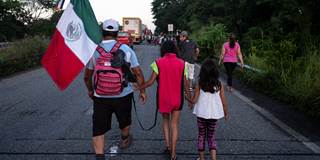Throughout the West, populists and nationalists have hijacked the migration debate by framing the issue solely in terms of cultural identity. Their strategy, while often electorally successful, is laying a foundation for weaker growth and higher levels of inequality across the world’s aging advanced economies.
OXFORD – Debates about immigration are roiling the world’s democracies. In the run-up to the US midterm elections this year, President Donald Trump sought to rally his base by making an issue out of a “caravan” of impoverished Central Americans making its way on foot to the southern border. In the United Kingdom, warnings of imminent mass immigration of Turkish people contributed to the June 2016 vote in favor of leaving the European Union. In Italy, Hungary, Austria, and elsewhere, populists have tightened their grip on power by politicizing flows of migrants and asylum seekers from the Middle East and North Africa. And, in Germany, Friedrich Merz, a Christian Democrat who hopes to succeed Chancellor Angela Merkel, recently questioned whether the right to asylum should remain enshrined in Germany’s post-war constitution.

OXFORD – Debates about immigration are roiling the world’s democracies. In the run-up to the US midterm elections this year, President Donald Trump sought to rally his base by making an issue out of a “caravan” of impoverished Central Americans making its way on foot to the southern border. In the United Kingdom, warnings of imminent mass immigration of Turkish people contributed to the June 2016 vote in favor of leaving the European Union. In Italy, Hungary, Austria, and elsewhere, populists have tightened their grip on power by politicizing flows of migrants and asylum seekers from the Middle East and North Africa. And, in Germany, Friedrich Merz, a Christian Democrat who hopes to succeed Chancellor Angela Merkel, recently questioned whether the right to asylum should remain enshrined in Germany’s post-war constitution.